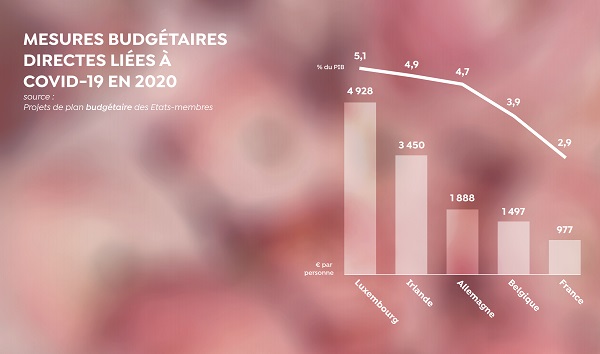
On Wednesday 16 December 2020, Luxembourg's Minister of Finance, Pierre Gramegna, made a statement in the Chamber of Deputies (Parliament) on the bill concerning the 2021 state budget, following the presentation by budget rapporteur François Benoy.
In his speech, Minister Pierre Gramegna first noted the improved economic outlook. On the basis of the most recent projections from STATEC, the International Monetary Fund (IMF) and the European Commission, the decline for the year 2020 will be less pronounced than that forecast in the scenario adopted for Luxembourg when the budget was tabled in October 2020. Despite the uncertainties that persist around the pandemic, a strong rebound in economic activity in the third quarter was observed. The prospect of imminent vaccination of the population also gives cause for hope, in that it will pave the way for a lasting economic recovery. Moreover, the forthcoming implementation of the European Union's €1.074 billion multiannual financial framework (MFF) and the €750 billion “Next Generation EU” recovery plan constitute a real additional budgetary impetus for all European economies.
The Finance Minister then recalled the main axes of the 2021 budget, which are in line with the country's fight against the COVID-19 pandemic, while laying the groundwork for a sustainable recovery. In this context, he referred to the latest developments since the budget was tabled in October, including the extension of aid schemes and the introduction of new measures to support the economy following the latest restrictions. These measures gave rise to corresponding budgetary amendments, namely:
- the provision of an additional €30 million to finance the new measures announced within the framework of the recovery and solidarity fund for businesses;
- the release of €20 million to support the financing of projects in the fight against the virus via the aid scheme;
- an extension of €30 million to finance the extension of investment aid in the context of the crisis;
- an envelope of €20 million to support the companies most affected by the crisis, particularly in the hospitality sector, by offering the possibility of better supporting the burden resulting from the 2.8% increase in the minimum social wage from 1 January 2021;
- an increase in the budget of the Ministry of Health of around €16.5 million to finance the purchase of the vaccine;
- an increase in the budget for the services of the Grand Ducal Fire and Rescue Corps (Corps grand-ducal d'incendie et de secours - CGDIS) to the tune of €500,000;
- the reimbursement by the state to the National Health Fund (Caisse Nationale de Santé - CNS) of €386 million over four fiscal years in the context of the financing of family leave and financial allowances.
The overall budgetary impact of these new measures amounts to €191 million for the financial year 2021. As such, the central government balance will have a deficit of €2.7 billion in 2021, instead of €2.5 billion as previously estimated.
The Minister of Finance also insisted on the relevance of the package of fiscal measures which reinforce and complement the priorities of the 2021 budget insofar as they will contribute to social equity and the competitiveness of the Grand Duchy, as well as the sustainable development of the country. He particularly welcomed the positive reception of the reduction in the subscription tax for sustainable investment funds and the introduction of a new regime for impatriates.
Minister Pierre Gramegna also welcomed the positive opinion that the European Commission has issued on the Grand Duchy budget plan. The Commission underlined the merits of Luxembourg's budgetary policy in the context of the crisis and considered that the government's measures to support the Luxembourg economy were taken in good time and were well founded.
The measures introduced in Luxembourg have been the most generous in the EU. In Luxembourg, they represent €4,928 per person, compared to €1,497 in Belgium, €977 in France and €1,888 in Germany. Ireland occupies second place after Luxembourg, with €3,450 per person.
The European Commission also confirmed that, through these measures, the country appears to be well equipped to intelligently meet the complex challenges that lie ahead for the coming months. Investments, which will reach a record level in 2021, will accelerate the green and digital transition and improve the competitiveness of the Grand Duchy in the medium and long term. In this context, the minister welcomed the consensus emerging through all the opinions of professional chambers and other observers on the need to maintain public investments at a high level.
Finally, Luxembourg's Minister of Finance recalled that the country was able to tackle the crisis with a favourable budgetary situation due to the prudent budgetary policy carried out by the government in recent years. In the context of the health crisis, Luxembourg is thus the European country with the lowest increase in its public debt, which will increase by 7.4% of GDP between 2019 and 2021 (compared to 10.7% in Germany and 16.4% in the euro zone).
Minister Pierre Gramegna commented: “The developments of the last three months show that there are good reasons to be optimistic for the year 2021 and that this very exceptional year promises to end on a more positive note. The 2021 budget, through its fiscal measures and high public investments, is resolutely oriented towards the future. It lays the groundwork for a sustained recovery and will help prepare our country, its companies and their employees to meet the challenges of the post-crisis period. In the coming years, the government will ensure that it pursues its prudent, sustainable and responsible budgetary policy to ensure the long-term prosperity of the Grand Duchy”.









